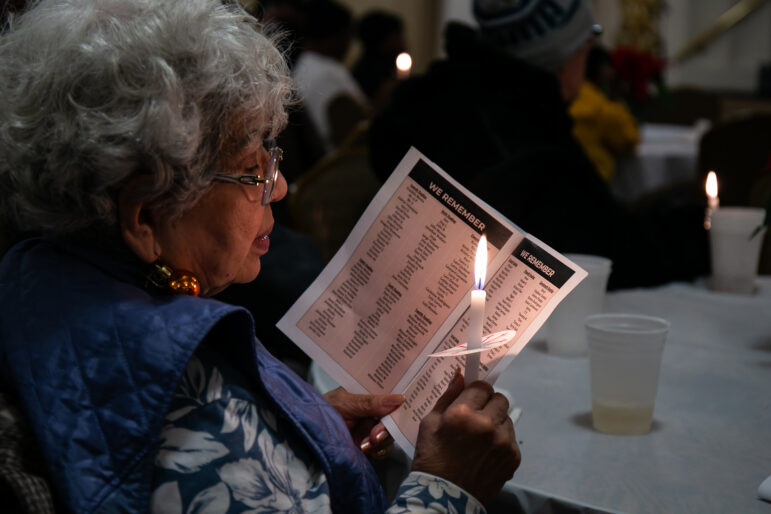“Homeless Persons’ Memorial Day” has taken place every December for more than 20 years. The event serves both to remember and mourn those who died, and as a stark reminder of how homelessness is also a health crisis, its organizers say.
Adi Talwar
An attendee holds a candle and a program listing the names of the dead at the 2024 Homeless Persons’ Memorial Day at Congregation Rodeph Sholom on Manhattan’s Upper West Side.
For more than an hour, a series of speakers read the list of 376 names, a bell tolling between each one. The names were also displayed on a screen behind the speakers, alongside small details about the person being remembered: their age, or how they died. That they’d wanted to be a singer, enjoyed playing dominoes, or that their favorite food was soup.
Their ages ranged from 21 to 94. Some were listed by their first name only, or just their initials, or a nickname. All of them had passed away in 2024, and all had experienced homelessness.
“It’s critically important to recognize our neighbors that don’t get a lot of acknowledgement,” said Frederick Shack, the CEO of Urban Pathways, which runs drop-in shelters, supportive housing and outreach programs for unhoused New Yorkers.
The group and fellow nonprofit Care for the Homeless host “Homeless Persons’ Memorial Day” every December, and have done so for more than 20 years. The event serves both to remember and mourn those who died, and as a stark reminder of how homelessness is also a health crisis.
“[It’s] ridiculous, that we, in the richest city in the world, should be memorializing 376 people who, most of them, died prematurely,” said Care for the Homeless President & CEO George Nashak. “Homelessness and healthcare are inextricably tied.”
Homelessness “can be caused by episodes of bad health,” he added, such as a mental health condition or accrued medical debt. It’s also “really, really difficult to deal with chronic medical conditions if you’re homeless,” Nashak said, citing the example of someone trying to manage diabetes.
Adi Talwar
Attendees hold candles at the Homeless Persons’ Memorial Day event on Dec. 18, 2024.
“How do you keep your insulin at the appropriate temperature? How do you have clean needles to inject yourself?” he asked. “Everything about homelessness makes it more difficult.”
The annual list of those lost is crowdsourced by staff and clients at around 20 New York City homeless service providers, who submit the names of those they knew who passed away over the last year.
Adi Talwar
The organizers rang a bell after each person’s name was read.
Some of those named died in the process of finding a home, their eulogies noted: one man was awaiting a veterans housing voucher when he went into the hospital and never came out; another passed just three months after moving into a new apartment.
Christopher Steele was remembered as a “true storyteller” who brought up his children in every conversation, his case worker recalled. Smiley M., who was born in Jamaica, liked making collages and loved the color white, to the extent that he would paint his own shoes. Zachary D., 22, had dreams of traveling cross country and adopting a puppy, those who knew him said.
Adi Talwar
The names of 376 New Yorkers experiencing homelessness who died in 2024, displayed at the memorial.
“Thank you to everyone who contributed to the names that were read tonight,” Will Woods, an advocate with Urban Pathways and board member at Care for the Homeless, said as the program came to a close. “Thank you for joining us to remember the lives of our neighbors that have been lost to the impacts of homelessness. Thank you for that, because it’s a statement, it’s a reminder we matter.”
Those acknowledged at the event represent just a portion of the unhoused people who die in New York City each year. During fiscal year 2023, the most recent year for which data is available, the city reported 840 deaths among people experiencing homelessness, a record high for the fifth straight year in a row.
NYC Dept of Health and Human Services
Data for homeless deaths reported by the city’s Departement of Homeless Services (DHS) and Human Resources Administration (HRA).
More than half of those deaths were drug-related; another 13 percent were attributed to heart disease. Five homeless New Yorkers died from COVID-19 that year, and 10 from pneumonia or the flu.
Another 18 died by homicide—highlighting the increased vulnerability to violence that homeless New Yorkers face. Just days after the memorial took place, Debrina Kawam, who’d spent time in the city’s shelter system, was fatally lit on fire while sleeping on a Brooklyn F train.
Adi Talwar
The Fire Ensemble performing at Homeless Persons’ Memorial Day on Dec. 18, 2024.
The remembrance event, says Shack of Urban Pathways, “helps us think about what we can do differently going forward.” That includes increasing the city’s supply of affordable housing, better access to medical and behavioral health care, and ensuring workers are paid living wages, he and Nashak said.
“The reality is that if we are able to provide access to housing that is affordable, and that’s decent, and then bring a level of services that are necessary to help [people] maintain their housing, we can solve this problem,” Shack said. “We spend billions of dollars on shelter, so it’s not a matter of having the resources. It’s a matter of philosophy and having the political will.”
To reach the editor, contact Jeanmarie@citylimits.org
Want to republish this story? Find City Limits’ reprint policy here.
The post Remembering the Homeless New Yorkers Lost Last Year appeared first on City Limits.

